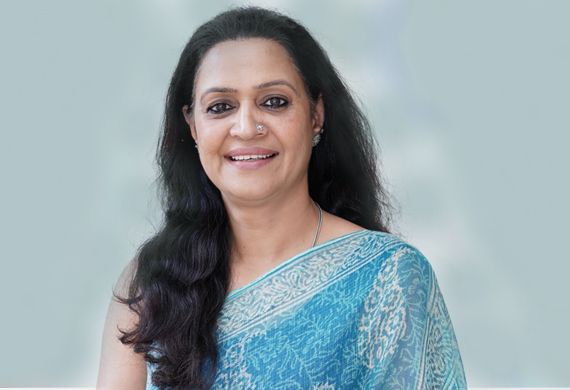
Balancing Traditional Teaching & Innovation to Improve Learning Outcomes
By: Nisha Bhakar, CEO - Education Business, Vishwa Samudra Holdings
Nisha Bhakar, CEO of Education Business, Vishwa Samudra Holdings, has over two decades of experience in education, setting up progressive schools across National & International Boards in major cities like Gurgaon, Hyderabad, Jaipur & Dehradun, she is currently setting up Nandha Gokulam Life school at Nellore which is the first residential school for underprivileged boys with international facilities, under the Chinta Sasidhar Foundation. Nisha has been the recipient of the 'Best Educationist Award' by the International Institute of Education and Management, and several other prominent awards.
In a recent conversation with Women Entrepreneurs Review Magazine, Nisha shares her viewpoints on the need to transition from traditional schooling to innovative pedagogical approaches. She mentions the need of balancing the teaching experiences with insightful leadership to improve learning outcomes in classrooms.
Given the rapid evolution of educational technology and changing student needs, how do you envision the role of traditional schooling evolving over the next decade? What innovative approaches do you believe will be essential for schools to stay relevant?
The Indian education system faces a significant gap in access to education due to the diverse needs of the young population and unequal access to quality education. There are two types of schools: privileged schools with technology and advanced pedagogies, and those without. The COVID-19 pandemic has further exacerbated this inequity. To succeed, schools must shift their delivery of education, focusing on technology and personalized learning. Teachers must be trained to transition from traditional to progressive settings. AI can play a critical role in teacher training and administrative tasks. However, implementing policy changes and creating an infrastructure for progressive learning is essential. Collaboration between the government, educational institutions, and tech companies is crucial for creating appropriate solutions for different schools and student needs.
In an age where digital learning platforms are increasingly popular, how do you think leaders can balance the integration of technology with maintaining a strong, personalized educational experience in schools?
The shift from traditional classroom setups to digitally savvy ecosystems requires a shift from merely introducing digital platforms to rethinking teaching and learning experiences. This requires insightful leadership, especially in India, where context changes constantly. Balancing at all levels, and stakeholders, and choosing the right technology fit is crucial. Schools should invest in technology integration aligned with pedagogical goals, with teachers trained well to use it as an enabler. Technology must be leveraged to push personalized learning, accelerate learning for students and teachers, and allow teachers to meet students where they are.
With varying standards and resources across different regions, what strategies do you think are crucial for ensuring that high-quality education is accessible in both urban and rural areas?
High-quality education is often associated with private schools, which are expensive and unaffordable for many pockets. In India, most students enroll in government schools. To improve learning outcomes, government schools need to be strengthened and accountability ensured at all levels. The Chinta Sasidhar Foundation, promoted by Vishwa Samudra Holdings, is one of the first corporate houses to set up a residential school with international facilities for underprivileged children. Setting up quality schools requires proper professional development, the right ecosystem and facilities, and technology integration to ensure quality education. We hope many more Business Houses will step in to set up schools that compete with some of the known private schools.
When setting up new schools, how do you incorporate flexibility in design to adapt to future educational trends and changes in student demographics? What role does physical space play in facilitating modern teaching methods?
I have been involved with many school projects right from conceiving the whole school concept , the design, vision of the school, why are we setting up school and how would we want classroom transactions, hostels, the dining hall, the sports field, the whole school ecosystem to look like.
The designing stage of school involves collaboration between end users, educators, school leaders, and architects. Architects create schools that capture the school's vision, ethos, and culture, using green solutions like eco-friendly classroom construction and natural light. Schools must consider regional climates while designing learning spaces and incorporate features like rainwater harvesting, solar systems, and green roofs, etc. into their curriculum and not just the design. These integrations should not only help students develop a sustainable mindset but also promote environmental sensitivity. Technology should be integrated into school infrastructure to enhance safety, security, and efficiency. Students should be educated about the futuristic and sustainable nature of these facilities, preparing them for the future.
As we move towards a future where skills like critical thinking and emotional intelligence are becoming increasingly important, how are you adapting school curricula to prepare students for the challenges and opportunities of tomorrow?
Critical thinking and emotional intelligence are essential skills for students to develop. Critical thinking involves analyzing, evaluating, and interpreting information thoughtfully, questioning assumptions, identifying biases, and recognizing patterns. Emotional intelligence involves understanding and managing one's emotions and those of others. However, schools often focus on textbooks rather than incorporating these skills into their curriculum. Teachers should be trained in critical thinking and emotional intelligence through proper reading and research.
Institutions can develop a curriculum around animal husbandry, including plants and animals, and scientifically integrate technology. This hands-on, project-based learning approach helps students understand their school context and bring it into their lives. We have to take learning beyond books and into real life.
Our school Nandha Gokulam Life School at Nellore has cows, bulls, calves, horses and dogs as pets. Every student has adopted a cow or a bull and he interacts with his animals on a regular basis, building bonds and understanding their behaviour which allows students to develop emotional intelligence naturally. They design solutions for various animal projects that they do as part of their learning process.
Students and teachers also work on the herbal and fruit farms on campus understanding how plants grow in specific regions and what can be done to make the plant healthier.
In conclusion, critical thinking and emotional intelligence are crucial for students to develop empathy and understanding towards their ecosystems.
Looking at educational trends globally, which international practices or policies do you think could be adapted to improve the schooling system in India? How can these be integrated effectively?
Education space must be treated more professionally. Teachers play a crucial role in the effectiveness of schools, and it is essential to provide in-depth, rigorous, and scientifically designed training for teachers and school leaders. In today’s dynamic education world, teachers must stay in sync with real-world situations and promote professional development. Classrooms should encourage deeper dialogues between peers and teachers. Learning from the West's success in integrating technology is definitely what we must learn. However, it is also essential to revive Indian civilization through schools, drawing inspiration from our cultural values and lifestyles which are storehouses of knowledge and solutions to many problems that we face today.
Nandu Gokulam Life School is a school that focuses on cultural reawakening, focusing on scientifically developed texts, and age-appropriate curriculum. Indian scholars of our heritage should be engaged to contribute and disseminating these resources to children, thereby ensuring schools are equipped to provide quality education.
Message to Readers
Let's take education very seriously. The government and private organizations should improve teacher pay to attract talent and address education issues. Re-looking at revamping the education system to be more scientific and culturally rooted is crucial.
Most Viewed
- 1 Women's Health Startup HerMD Closing Doors Amid Industry Challenges
- 2 5 Famous Women in Indian Armed Forces
- 3 Saudi Women No longer Require Male Permission for Clothing Choices, says Prince MbS
- 4 Kolkata Medtech Startup Innovodigm Raises Rs 5.5 Crore Seed Funding Led by IAN Group
- 5 Yamunanagar's Kashish Kalra Honoured after Securing 111th Rank in UPSC Civil Services Exam
- 6 Madurai Appoints Its First Woman Corporation Head
- 7 IAS Vijayalakshmi Bidari Appointed as the new Nagpur Divisional Commissioner
- 8 American Entrepreneur Lucy Guo Overtakes T Swift to become Youngest Female Billionaire
- 9 ICC Women's World Cup 2025 Trophy Showcased at Indore's Holkar Stadium
- 10 Aparna Saxena's Beauty Venture AntiNorm Launches in India
- 11 Vidya Nataraj Co-Founded BlueStone Jewellery & Lifestyle files IPO
- 12 5 Women Freedom Fighters of India
- 13 Dr. G Krishnapriya appointed as CEO for Trichy
- 14 M3M & Sirona Partner to Introduce Menstrual Hygiene Vending Machines in 15 Locations
- 15 Punjab Govt launches SHE Cohort 3.0 Supporting Tech-led Women Startups
- 16 Indian origin Lawyer, Sweena Pannu appointed as the US New Superior Court Judge
- 17 The Aurora Tech Award recognizes 4 Indian Women-led Startups
- 18 Kerala's Republic Day parade featured an all-female tableau
- 19 Manisha Kabbur Becomes Karnataka's First Woman International Karate Coach
- 20 Director K. S. Ravikumar's Daughter Maalica Ravikumar Launches Life Coaching Company 'Evergrowth Academy' for Women
- 21 Leezu's Raises Pre-Seed Funding to Accelerate Growth in Sexual Wellness Industry
- 22 Sattu: Super-easy summer drink for PCOS gut healing
- 23 Swathi Nelabhatla creates Sitha App, India's First Women-Exclusive Gig Platform
- 24 7 Timeless Female Kathak Dancers & their Iconic Legacies
- 25 Meet 7 Iconic Women Architects of Modern India & their Most Impactful Work
- 26 This Woman-led Insuretech Startup is Helping Bridge the Education Financing Gap in India
- 27 Women Leaders Share Lessons Learnt from India Women's WC Win
- 28 5 Enterprising Women Founders Powering Singapore's Tech & Innovation Landscape
- 29 4 Women. 4 Stories. One Vision for Smarter, Stronger Healthcare
- 30 Global Gender Gap Narrows to 68.8%, But Full Equality 123 Years Away: WEF Report 2025
- 31 Changemakers: 7 Women Entrepreneurs Taking the Make in India Movement Forward
- 32 Meet Lucy Guo, The Youngest Self-Made Female Billionaire Disrupting Tech
- 33 How Women are Driving India's Festive Online Shopping Surge






